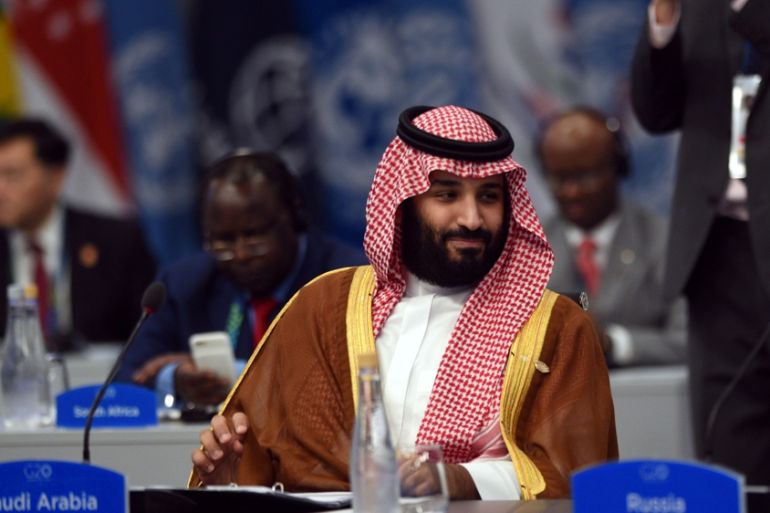MBS approved ‘intervention’ against dissidents: NYT report
The New York Times says MBS authorised a clandestine campaign against Saudi dissenters before Jamal Khashoggi’s murder.

More than a year before the killing of journalist Jamal Khashoggi, Saudi Arabia’s powerful Crown Prince Mohammed bin Salman, also known as MBS, approved a secret campaign to silence dissenters, the New York Times has reported.
The campaign included surveillance, kidnapping, detention and torture of Saudis, said the report published on Sunday citing the US officials who have read classified intelligence reports about the effort.
Keep reading
list of 4 itemsMacron defies criticism to host Saudi Crown Prince MBS in Paris
Saudi Arabia, Greece to sign energy deal, Crown Prince MBS says
UAE arrests Khashoggi’s US lawyer on money laundering charges
American officials referred to it as the Saudi Rapid Intervention Group, the Times said.
One of the victims of this group was a university lecturer who reported on the situation of women and was tortured last year, prompting her to attempt suicide.
Saudi Arabia has a long history of pursuing dissidents, including those based outside the country, but this practice has seen a major upsurge following Prince Mohammed’s promotion as the crown prince in 2017.
At least some of the clandestine missions were carried out by the members of the team that killed and dismembered Khashoggi in October at the Saudi consulate in Istanbul, suggesting his murder was part of a wider campaign against dissidents, the report said, citing the US officials and associates of some Saudi victims.
These members were involved in at least a dozen operations beginning in 2017, the officials said, including forcibly repatriating Saudis from other Arab countries.
Authorised by MBS
The murder of Khashoggi, a Washington Post contributing columnist, generated global outrage, leading to a call by some US senators for President Donald Trump to designate and punish those responsible.
Trump did not comply.
The senators, briefed by the heads of US intelligence agencies, said they were convinced that Prince Mohammed was responsible for the Khashoggi killing.
Saudi Arabia has stressed the prince was not involved.
The kingdom initially said it had no knowledge of Khashoggi’s fate but later blamed its rogue agents for his gruesome murder.
Saudi Arabia’s public prosecutor has charged 11 people over his murder.
The Rapid Intervention Group was authorised by Prince Mohammed and overseen by Saud al-Qahtani, a royal court insider, American officials told the Times.
US intelligence reports did not specify how involved Prince Mohammed was with the group’s work, but said that the operatives saw al-Qahtani as a “conduit” to the prince, the report said.
Al-Qahtani has been sacked over Khashoggi’s murder but Saudi authorities have not said if he was among those charged. Five of the accused face the death penalty.
Harassing rights activists
According to the New York-based newspaper, the Rapid Intervention Group has been involved in the harassment of arrested prominent human rights activists and women’s rights defenders, including Loujain al-Hathloul, Aziza al-Yousef and Iman al-Najfan.
Alia al-Hathloul says that al-Qahtani attended several such sessions to torture her sister. He also threatened to kill Loujain and throw her body into the sewers, Alia says.
According to the newspaper, the women were beaten, subjected to electric shocks, waterboarding, and threatened with death and rape during the interrogations.
Loujain’s sister says that at first the Saudi authorities did not send the arrested women to jail, but in a secret location in the Red Sea city of Jeddah.
According to US intelligence assessment, the brutal interrogations prompted university professor al-Najfan to attempt suicide.
The women’s trial began last Wednesday after nearly a year in detention, but the Saudi government did not announce the charges against them.
Saudi denial
The intervention team was so busy that in June its leader asked a top adviser to Prince Mohammed whether he would give them bonuses for Eid-ul-Fitr, a major festival at the end of the Muslim holy month of Ramadan.
Saudi officials declined to confirm or deny that such a team existed, or answer questions from the Times about its work.
According to a spokesperson for the Saudi embassy in Washington, the kingdom “takes any allegations of ill-treatment of defendants awaiting trial or prisoners serving their sentences very seriously”.